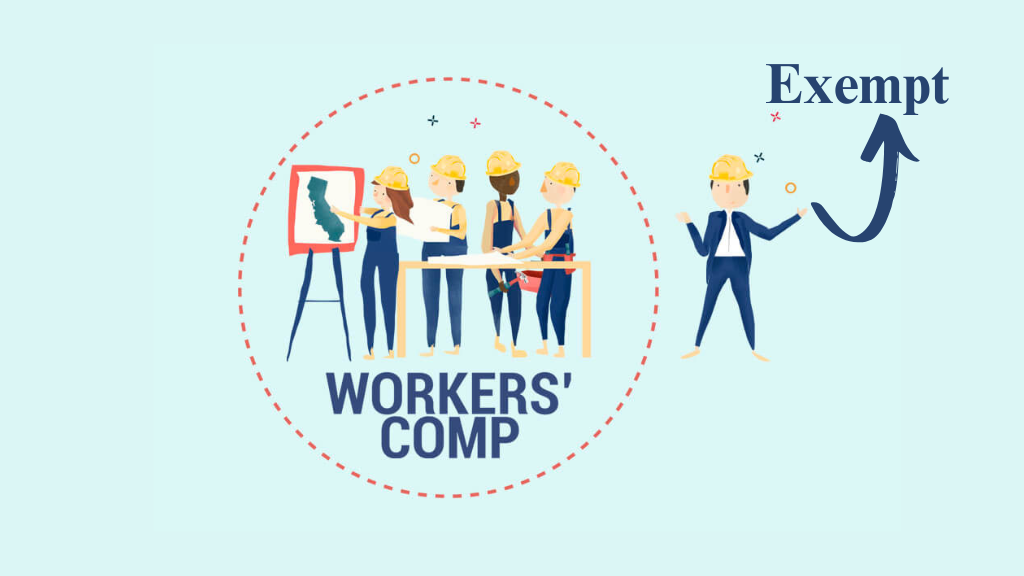Hugh Pham | Insurance Agency Principal
How to Get Workers' Compensation Insurance in California
See How We're Different
or call us: 866-226-4436
Workers' compensation insurance is an essential protection for businesses in California. This type of insurance provides
coverage for employees who suffer work-related injuries or illnesses. It ensures that injured workers receive necessary medical treatment and wage replacement benefits while
protecting employers from potential litigation. If you're a business owner in California, it's crucial to understand how to obtain workers' compensation insurance to
comply with state laws and protect your employees and business.
Understanding Workers' Compensation Insurance
Before we delve into the steps to acquire workers' compensation insurance in California, let's first clarify what this insurance entails and why it's important.
Workers' compensation insurance, also known as workman's comp, is a form of insurance that provides coverage for employees who suffer job-related injuries or illnesses. It typically covers the costs of medical treatment, rehabilitation, and lost wages resulting from a workplace injury or illness.
When an employee gets injured or falls ill due to work-related activities, workers' compensation insurance steps in to provide financial support. This coverage ensures that employees receive the necessary medical attention and wage replacement during their recovery period. It acts as a safety net, protecting the rights of employees and providing them with the peace of mind they need to focus on their recovery.
Importance of Workers' Compensation Insurance
Workers' compensation insurance is essential for both employers and employees. For employees, it ensures that they receive prompt medical attention and wage replacement if they sustain work-related injuries or illnesses. It also protects their rights by providing a safety net that covers expenses during recovery.
Imagine a scenario where an employee falls from a ladder while performing their duties. Without workers' compensation insurance, they may face significant financial burdens, such as medical expenses and lost wages. However, with proper coverage, the employee can receive the necessary medical treatment, rehabilitation, and wage replacement, allowing them to focus on their recovery without worrying about the financial implications.
For employers, workers' compensation insurance is necessary to meet legal requirements and protect the business from potential lawsuits. Without adequate coverage, businesses may face significant financial burdens resulting from medical expenses and legal fees.
Furthermore, workers' compensation insurance helps employers maintain a positive work environment. By providing coverage for work-related injuries and illnesses, employers demonstrate their commitment to the well-being and safety of their employees. This, in turn, fosters a sense of loyalty and trust among the workforce, leading to increased employee morale and productivity.
Moreover, workers' compensation insurance can also protect employers from potential lawsuits. In the event of a workplace injury or illness, employees who receive proper compensation are less likely to pursue legal action against their employer. This can save businesses from costly legal battles and reputational damage.
In summary, workers' compensation insurance is a crucial aspect of the employer-employee relationship. It provides financial support and protection for employees who suffer work-related injuries or illnesses, ensuring their well-being and peace of mind. For employers, it fulfills legal requirements, safeguards the business from potential lawsuits, and fosters a positive work environment.
California Workers' Compensation Insurance Laws
California has specific laws and regulations in place to govern workers' compensation insurance. Understanding these requirements is crucial to ensure compliance and avoid penalties.
Workers' compensation insurance is a vital protection for both employees and employers. It provides financial assistance to employees who suffer work-related injuries or illnesses, covering medical expenses, lost wages, and rehabilitation costs. For employers, it offers protection against potential lawsuits and legal liabilities.
Overview of California State Requirements
California law mandates that employers with one or more employees must provide workers' compensation insurance. This includes both part-time and full-time employees, as well as family members who work for the business. The purpose of this requirement is to ensure that all workers are adequately protected in case of work-related accidents or illnesses.
Employers have the option to purchase workers' compensation insurance from private insurance carriers or obtain it through the State Compensation Insurance Fund (SCIF). The coverage must meet the minimum requirements set by the state, including medical benefits, temporary disability benefits, permanent disability benefits, and death benefits.
It is important for employers to accurately classify their employees to determine the appropriate workers' compensation insurance coverage. Misclassification can lead to penalties and legal consequences. Independent contractors, for example, are not considered employees and are not covered by workers' compensation insurance.
Penalties for Non-Compliance
Businesses that do not comply with California's workers' compensation insurance laws face consequences that can have long-lasting financial and legal implications. Non-compliance may result in fines, stop-work orders, personal liability for business owners, and even criminal charges in some cases.
The California Division of Workers' Compensation (DWC) is responsible for enforcing workers' compensation laws and regulations. They conduct audits and investigations to ensure that employers are providing the required coverage. If an employer is found to be non-compliant, the DWC can impose penalties and take legal action to enforce compliance.
The fines for non-compliance can vary depending on the severity of the violation and the number of employees affected. In some cases, fines can reach thousands of dollars per employee. Additionally, the DWC can issue stop-work orders, which prohibit the employer from conducting business until they obtain the necessary workers' compensation insurance.
Business owners who fail to provide workers' compensation insurance may also face personal liability. Injured employees can file lawsuits against the employer to seek compensation for their injuries and related expenses. Without insurance, the employer may be personally responsible for paying these costs.
In extreme cases of non-compliance, criminal charges can be filed against the employer. This typically occurs when an employer intentionally fails to provide workers' compensation insurance or engages in fraudulent activities to avoid paying premiums. Criminal charges can result in fines, imprisonment, or both.
It is essential for employers to understand and comply with California's workers' compensation insurance laws to protect their employees, their businesses, and themselves. By providing the required coverage, employers can ensure that injured workers receive the necessary support and avoid the severe consequences of non-compliance.
Steps to Acquire Workers' Compensation Insurance in California
Now that you understand the importance of workers' compensation insurance and the legal requirements in California, let's explore the steps you need to take to acquire this essential coverage.
Evaluating Your Business Needs
The first step in obtaining workers' compensation insurance is to evaluate your business needs. Consider the nature of your industry, the level of risk associated with your operations, and the number of employees you have. This assessment will help you determine the appropriate coverage and insurance provider for your business.
For example, if you own a construction company in California, you may have a higher risk of workplace injuries due to the physical nature of the work. In this case, you would need a comprehensive workers' compensation insurance policy that covers injuries such as falls, equipment accidents, and repetitive motion injuries.
On the other hand, if you own a small office-based business with minimal risk of workplace injuries, you may opt for a basic workers' compensation policy that covers accidents such as slips and falls.
Shopping for Insurance Providers
Once you have assessed your needs, it's time to explore different insurance providers. It's important to research and compare multiple options to find the best fit for your business. Look for providers with a strong track record in offering workers' compensation insurance and favorable terms and rates.
During your search, you may come across insurance providers that specialize in certain industries. These providers may have a deeper understanding of the unique risks associated with your industry and can offer tailored coverage options.
Additionally, consider the financial stability of the insurance provider. You want to ensure that they have the resources to pay out claims in a timely manner, should the need arise.
Applying for Coverage
After selecting an insurance provider, you will need to complete an application for workers' compensation coverage. Be prepared to provide detailed information about your business, such as your industry, number of employees, payroll expenses, and any existing claims history. The insurance provider will use this information to assess your risk profile and provide a quote for your coverage.
It's important to be thorough and accurate when filling out the application. Any discrepancies or omissions could result in delays or even a denial of coverage. Take the time to gather all the necessary information and double-check your application before submitting it.
Once you have submitted your application, the insurance provider will review it and may request additional information or clarification. This is a normal part of the process, so be prepared to provide any requested documents or answer any questions promptly.
After the review process is complete, the insurance provider will provide you with a quote for your workers' compensation coverage. This quote will outline the coverage limits, premium amount, and any deductibles or exclusions that may apply.
It's important to carefully review the quote and ask any questions you may have before making a final decision. Once you are satisfied with the terms and conditions, you can proceed with purchasing the workers' compensation insurance for your business.
Cost Factors for Workers' Compensation Insurance
Several factors influence the cost of workers' compensation insurance premiums. Understanding these factors can help you manage your insurance costs effectively.
Industry and Job Risk Factors
The industry your business operates in and the level of risk associated with specific job roles can impact your insurance costs. High-risk industries or jobs, such as construction or manufacturing, typically have higher premiums due to the increased likelihood of workplace injuries or illnesses.
Number of Employees
The number of employees you have also affects your workers' compensation insurance costs. Generally, the larger your workforce, the higher the premiums, as there is a greater likelihood of accidents or injuries occurring.
Company's Claim History
Your company's claim history plays a significant role in determining insurance rates. Businesses with a history of frequent or costly claims can expect higher premiums. Implementing safety measures to reduce workplace accidents and promptly addressing any injuries can help improve your claim history and potentially lower insurance costs.
Managing Your Workers' Compensation Insurance
After obtaining workers' compensation insurance, it's vital to actively manage your policy to ensure effective coverage and protect your business from potential risks.
Regularly Reviewing Your Policy
Review your policy on a regular basis to ensure it aligns with your business needs. As your company expands or changes, you may need to update your coverage to reflect the evolving risks. Consult with your insurance provider to discuss any necessary adjustments to your policy.
Maintaining a Safe Workplace
Creating a safe work environment is crucial for preventing workplace injuries and reducing the likelihood of workers' compensation claims. Regularly assess your workplace for potential hazards, provide employee training for safety procedures, and establish protocols for reporting and addressing unsafe conditions.
Handling Claims Efficiently
In the event of an employee injury or illness, it's essential to handle workers' compensation claims efficiently and promptly. Follow the necessary reporting procedures, provide support to affected employees, and work closely with your insurance provider to ensure a smooth claims process.
By following these steps and actively managing your workers' compensation insurance, you can protect your business and provide your employees with the necessary support in the event of work-related injuries or illnesses. Remember, compliance with California's workers' compensation insurance laws is not just a legal obligation; it's a commitment to the well-being of your workforce and the success of your business.
Recent News










Western Insurance
Marketing Corporation
Since 1963, Western Insurance Marketing Corporation, an independent insurance agency, has offered coverage clients require with the power of choice from top-rated national and regional insurance carriers.
9340 Bolsa Ave, Westminster, CA 92683
CA License #: 0548614
We are licensed in all 50 states, AZ, CA, CO, NM, NV, OR, TX, and WA.
All Rights Reserved | Western Insurance Marketing Corp. | Privacy Policy | Legal Disclaimer


